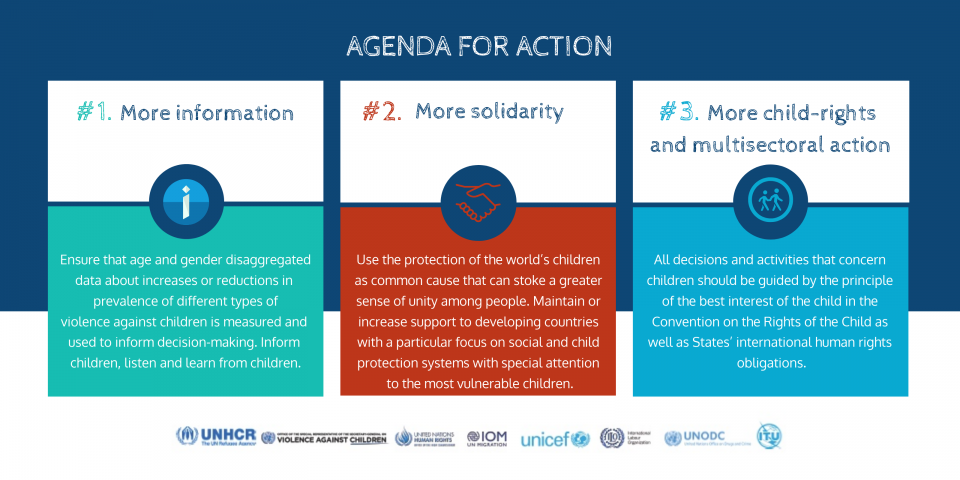Agenda for Action: 8 United Nations entities launch roadmap to protect children from violence in response to COVID-19

New York / Geneva 27 April 2020 - Following the the Secretary General’s policy brief on the impact of COVID-19 on children, the UN Inter-Agency Working Group on Violence against Children has put together an Agenda for Action. The Agenda for Action is based on the different mandates of the entities involved and provides a child rights and multi-sectoral framework for action.
The Agenda aims to mobilize Governments and other stakeholders around the world in defense of social services for children. A global crisis calls for a global response. Solidarity, multi-stakeholder cooperation and multilateralism are needed now more than ever.
The Agenda calls for strong mobilization of governments, bilateral/multilateral donors, civil society and private sector to:
• safeguard social protection, health, education and protection of children services;
• ensure children are duly protected and have the possibility to thrive and reach their full potential, when this crisis will be over;
• achieve the Goals and Targets of the Sustainable Development Agenda.
The COVID-19 pandemic has increased the vulnerability of those children already at risk as growing economic vulnerability will increase the threat of child labour, child marriage, child trafficking, sexual exploitation and recruitment into criminal groups, and armed groups and forces. In addition, movement restrictions, loss of income, isolation, overcrowding and high levels of stress and anxiety have added a new group of invisible at-risk children who are at increased risk of experiencing and observing physical, psychological and sexual violence and neglect at home.
There is emerging evidence that violence against children is increasing in all different forms, from domestic violence and abuse at home to excessive use of force by law enforcement while enforcing lockdown decisions against street children. In the words of the UN Secretary General: What began as a health crisis risks evolving into a broader child-rights crisis.
The United Nations Inter-Agency Working Group on Violence against Children calls on governments, the international community, civil society, human rights institutions, the private sector, workers’ organizations and leaders in every sector to ensure a child rights and multi-sectoral response to COVID-19 on three fronts:
1. More information
2. More solidarity
3. More Child Rights and Multisectoral action
The Agenda lists parts of a child rights and multisectoral framework for action for children recalling that all decisions and activities that concern children should be guided by the principle of the best interest of the child in the Convention on the Rights of the Child as well as States’ international human rights obligations and recommendations from international and regional human rights mechanisms.
The immediate priorities are: violence against children, child participation, access to computer and internet, online protection, mental health, alternative care, case management, children in detention, child labour and trafficking, children in humanitarian settings, children and armed conflict, social cohesion and the mid and long-term actions relate to transitions and fiscal policies and budget.
The Agenda provides concrete examples on how member states can place the protection of children’s rights as a top priority during the crisis and calls for using the protection of the world’s children as common cause that can stoke a greater sense of unity among people.
The proposed actions include: ensuring that essential child protection services are recognized as life-saving and continue to be provided, providing opportunities for children’s views to be heard and taken into account in decision-making processes on the pandemic; providing practical support to parents and caregivers, including how to talk about the pandemic with children, how to manage their own mental health and the mental health of their children, providing opportunities for children’s views to be heard and taken into account in decision-making processes on the pandemic, through consultation and dialogue; providing adequate responses to online violence, including guidance and tools for parents and carers on how to better protect children online and offline, including how to respond to and, if needed, report harmful contacts, conduct and content. ensuring border and movement restrictions are implemented in ways that ensure that children and families fleeing conflict and persecution can seek asylum and internally displaced children and families can move to safer areas in their own country, among others.
The Inter-Agency Working Group on Violence against Children is chaired by the Special Representative of the Secretary-General on Violence against Children with representatives from UNHCR, OHCHR, UNICEF, UNODC, ILO, IOM, ITU.
Download the Agenda for Action
Arabic version
Spanish version
French version
Russian version

